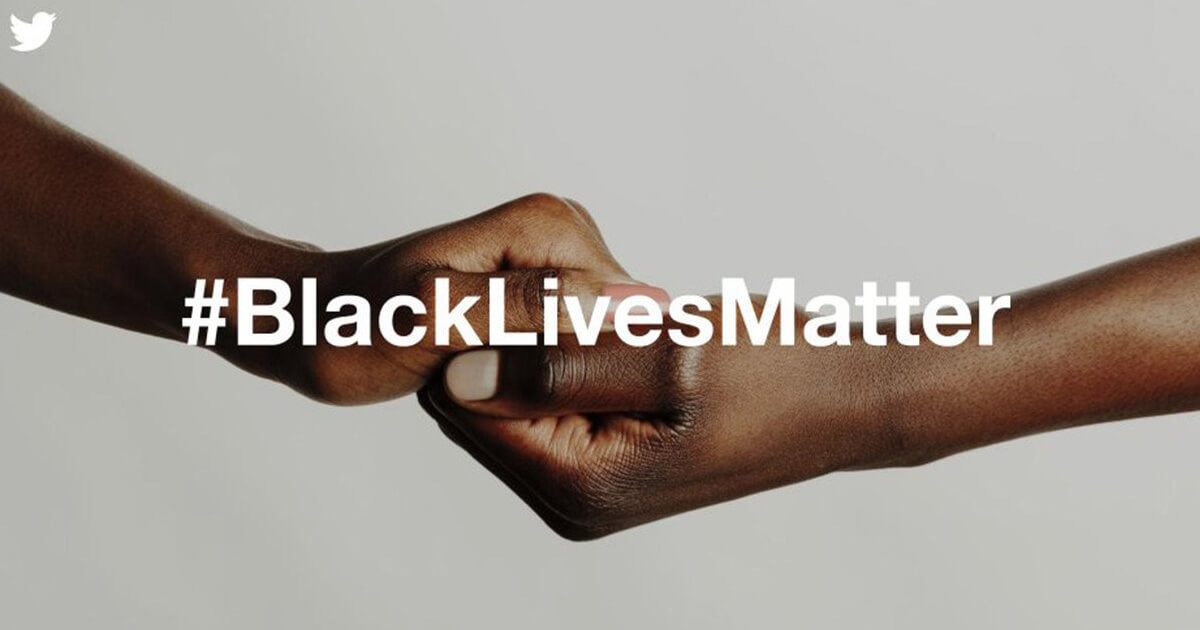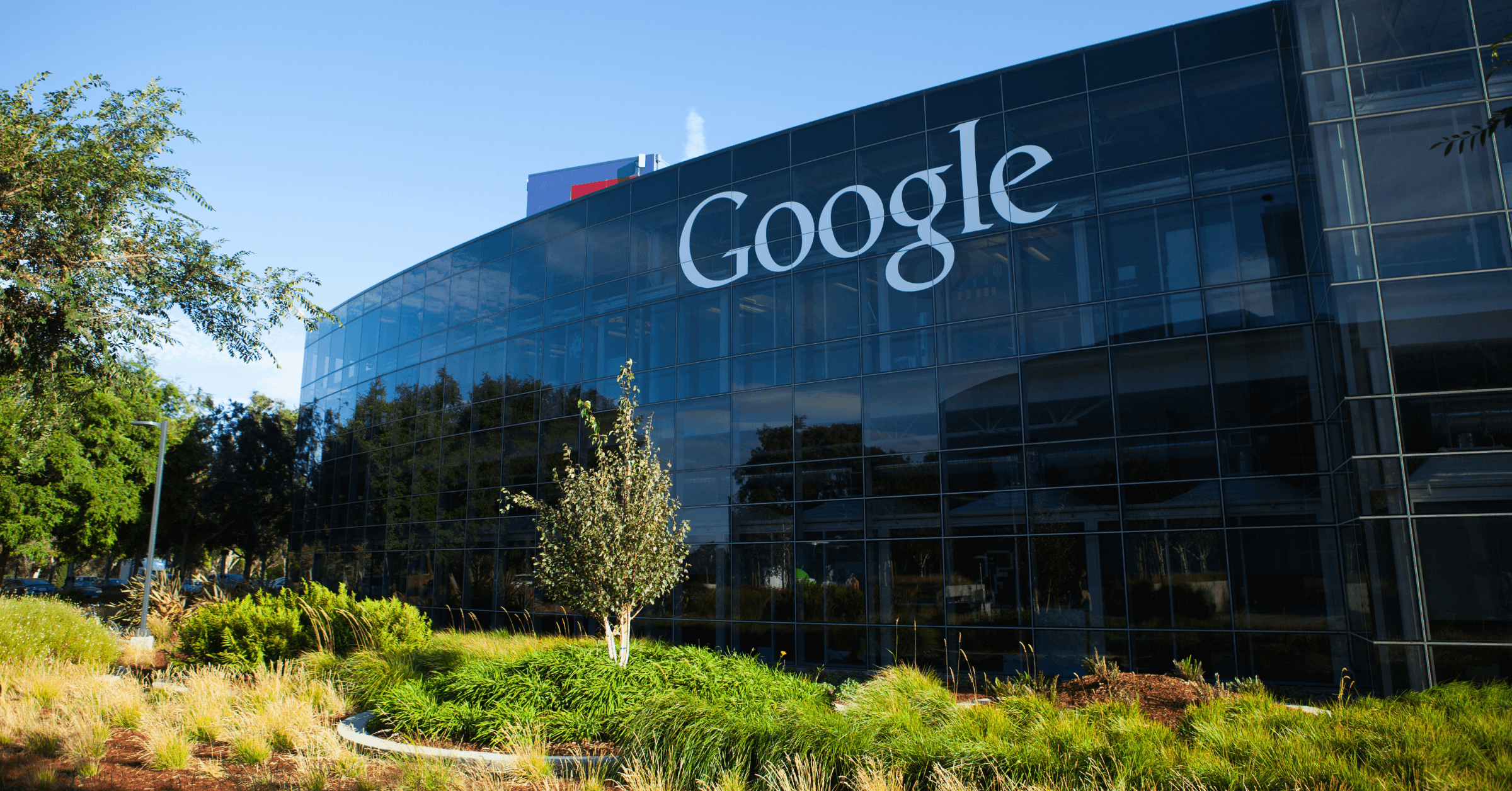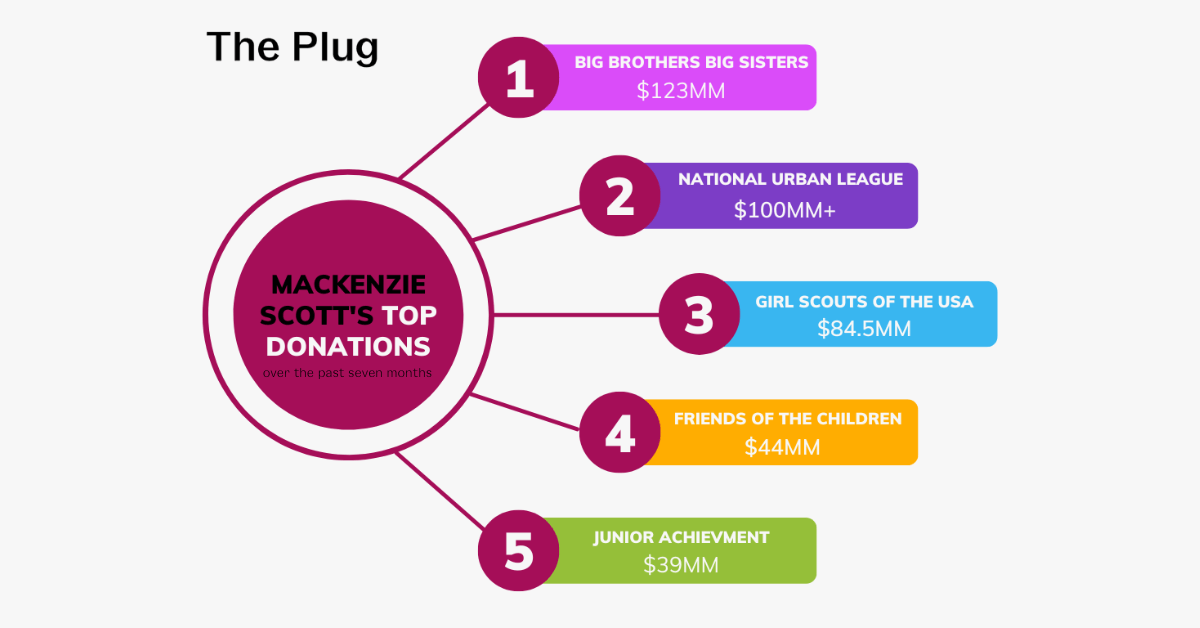Barely halfway through 2020, the murders of unarmed Black people have been trending across the news cycle in tandem with the updates of coronavirus-related fatalities disproportionately impacting Black communities.
As though navigating the terrain of a global public health crisis wasn’t enough, America’s ongoing commitment to systemic and structural racism has once again caught the attention of the world.
Following the murder of George Floyd, an unarmed Black resident, by a white Minneapolis police officer, Derek Chauvin, on Monday, May 25, protests have erupted in at least 75 cities across the country, including Atlanta, Los Angeles, and New York City.
Despite many efforts of organizers and residents to protest their dissent peacefully, chaos ensued. Police cars, restaurants, downtown hubs, and centers of commerce were set ablaze as residents, organizers, and even celebrities poured into the streets to protest yet another killing of an unarmed Black man by police.
Ordinarily silent on controversial racial issues, big tech decided to speak out.
Beginning as early as Thursday, May 28, leadership at Twitter, Apple, Salesforce, and others posted public admonitions of racism, anti-Black violence, or police brutality across their social media feeds.
A post shared by Netflix on Saturday evening said, “To be silent is to be complicit. Black lives matter. We have a platform, and we have a duty to our Black members, employees, creators and talent to speak up.”
On Saturday afternoon, The Plug began collecting public statements made by tech CEOs and executives.
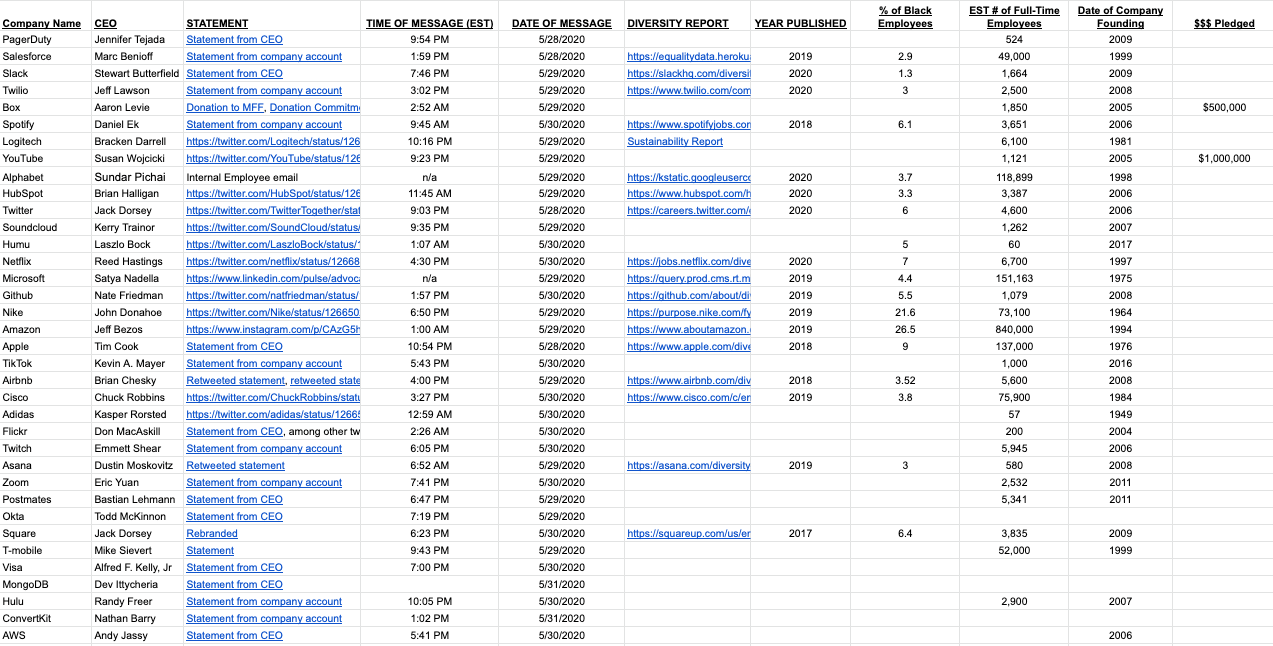
Protests Sparked by Recent Killings of Black People
In February of 2020, Ahmaud Arbery was shot in Southeast Georgia by two white men while jogging. In March, Breonna Taylor, 26, was shot eight times in her own home when Louisville police forcibly entered her apartment.
After footage of the murder of Floyd circulated online, thousands of people gathered in Minneapolis. While the four officers involved in the murder were fired on Tuesday, it took until Friday for Chauvin, seen in the video kneeling on Floyd’s neck, to be taken into custody and charged with third degree murder. The other three officers have yet to be charged.
A Change.org petition calling on Mayor Jacob Frey and County Attorney Mike Freeman to press charges against all the officers involved in Floyd’s death has since garnered more than 8 million signatures, making it the largest in the website’s history.
The murders of Floyd and Taylor by police officers are part of a long-standing trend of violence against Black people.
According to The Washington Post’s database tracking fatal shootings by police officers, between 2014 and 2019, over 5,000 people were killed. Though Black Americans account for less than 13 percent of the U.S. population, the data shows that they are killed at over twice the rate of white Americans.
Seemingly apathetic to these realities, in response to ongoing unrest in Minneapolis and viral videos of some people looting the city’s flagship Target retail store, President Donald Trump posted the following tweet on Thursday night calling civilians “thugs,” supporting military force against civilians, and explicitly stating: “when the looting starts, the shooting starts.”
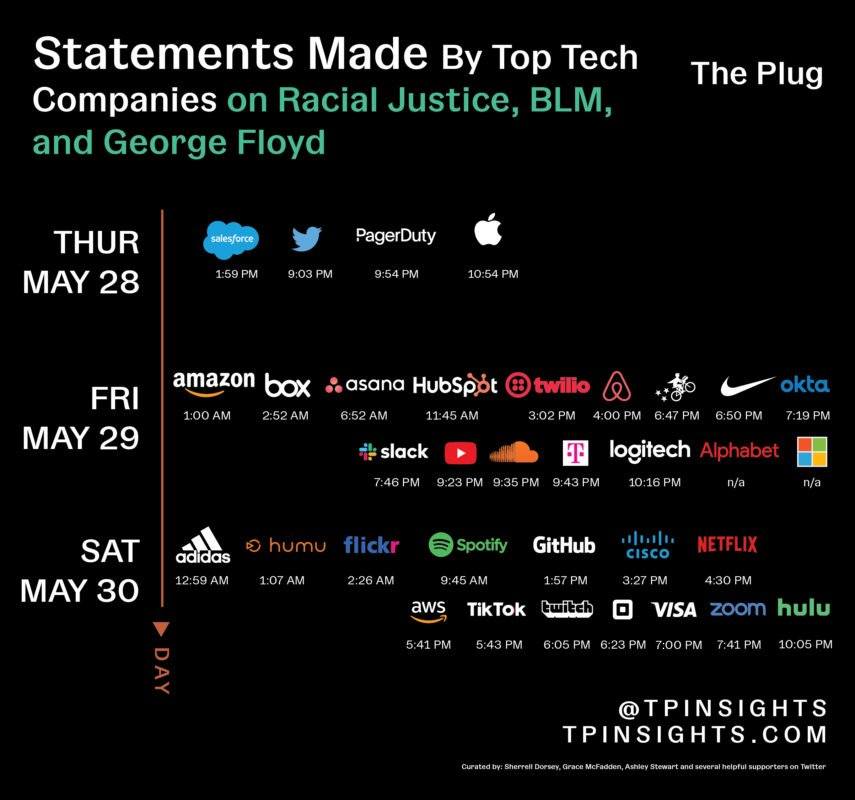
Tech Takes a Time Out, Makes Big Promises
Back at headquarters, some tech leaders took the time to address the current climate with their employees via letters and company-wide virtual meetings.
An internal letter sent to employees on Friday from YouTube CEO Susan Wojcicki, obtained by The Plug, included the following comments:
“Recently, there have been a number of senseless acts of violence against members of the black community, and if we’re being honest, these moments aren’t new at all. Unfortunately, racial injustice and brutality against black and brown people happen far too often, and these events compound the grief we’re already feeling right now.”
According to a tip from a YouTube employee who asked not to be named, employees host a weekly Friday meeting. It just so happened that Friday, May 29 marked the celebration of 15 years of YouTube. Instead of continuing with a planned virtual trivia show and team activities, the event was postponed, said the employee.
“We’re planning some moments for the black community and for allies to come together, and we will share more details on that soon,” wrote Wojcicki. She also said she heard from many employees about the emotions they’re experiencing, and that as a YouTube community, they were standing with those employees.
Sundar Pichai, CEO of Google’s parent company Alphabet, also sent an internal email to Google’s U.S. teams, calling out the injustices. He wrote in part that in addition to “bearing the burden of this deadly virus, Black communities are also experiencing a rash of violence in the U.S. The senseless deaths of George Floyd, Breonna Taylor, Ahmaud Arbery, and others have compounded the grief we’re already feeling during this time.”
Pichai went on to encourage employees to reach out to their managers and utilize mental health support services, and provided a list of resources to consult for self-education “instead of asking our Black community what you can do.”
Employees were also told that donations made to groups supporting racial justice initiatives would be matched up to $10,000 per employee.
There Isn’t a Neutral Position on Racism
Of the 30 tech companies we were able to confirm made public statements by Saturday night, Facebook’s Mark Zuckerburg was missing in action. The billionaire CEO had yet to make a statement, and people took notice. As of the publishing of this story, Facebook had not made a public statement.
One employee tweeted: “I don’t know what to do, but I know doing nothing is not acceptable. I’m a FB employee that completely disagrees with Mark’s decision to do nothing about Trump’s recent posts, which clearly incite violence. I’m not alone inside of FB. There isn’t a neutral position on Racism.”
Atlanta-based Mailchimp had also not yet made a statement. But one employee who asked not to be named did say that a private message was sent to a small group of employees.
“Our Diversity and Inclusion Officer [Shareka Nelson] spoke to us in a private group, but that was it,” said the Mailchimp employee. “We also have a meeting with our founders this week. I think they’ll address it then, but I don’t know.”
In an email to The Plug, Laszlo Bock, CEO of Humu and former VP at Google, admonished the silence of his peers.
“Tech CEOs’ inaction is part of the reason we are in the situation we’re in. They didn’t cause the legacy of oppression that exists in our country, nor the systematic discrimination Black people face every day. But their platforms enable division and hatred and they’ve done virtually nothing to combat that.”
Bock also called foul on the CEOs’ fears of “not wanting to get involved in politics” and potentially falling out of favor with their customers.
“But [they] spend millions of dollars on political lobbyists and fight hard for tax breaks, patent rights, and other legal protections,” he wrote. “Tech CEOs – indeed all CEOs – should be speaking up not just because their employees and customers are being impacted, but also because the next 6 months are a moment when there is an opportunity to lay the foundation for real change. Let’s see if they want it.”
A Future of Accomplices?
A few tech CEOs have made public pledges of financial support to organizations supporting efforts on the ground in the cities where protests have erupted. Box and Google committed to donating $500,000 to $1MM, respectively, to organizations supporting racial justice initiatives. But whether there will be ongoing efforts to increase diversity at their companies is not clear.
Historically big tech has lacked representation of Black employees within their ranks.
According to their own tracking and diversity reports, less than 4% of employees at Google are Black. The company employees over 100,000 people worldwide. Cisco, which employs over 75,000 people, also showed that just 3.8% Black workers. These statistics are on par with most of the companies listed in our database. This does not take into account which Black employees serve in technical versus service roles, or how diversity breaks down across the C-Suite.
As we released our initial findings publicly on Twitter, responses from current tech workers and smaller tech companies were skeptical that public statements made by CEOs were little more than an opportunity to soak in some good PR.
Dr. Nicki Washington, a computer science professor at Winthrop University in South Carolina, shared her sentiments on Twitter about tech company CEOs lionizing their promises to Black communities.
“Let’s hold them accountable and ensure they walk the walk in the days, weeks, months, and years to come.”
Contributors to the writing of this story include Grace McFadden, a student at the University of Connecticut majoring in English and minoring in computer science. Data visualization by Ashley Stewart of Patent Ventures. Information collected by The Plug and a host of Twitter users helping to identify company statements.

